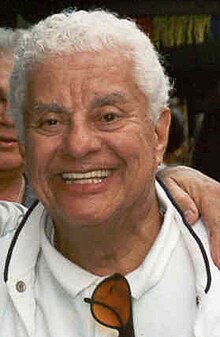Tito Puente
| Tito Puente | |
|---|---|
 |
|
| Background information | |
| Birth name | Ernesto Antonio Puente |
| Born |
April 20, 1923 New York City, New York, U.S. |
| Died | May 31, 2000 (aged 77) New York City, New York, U.S. |
| Genres | |
| Occupation(s) |
|
| Instruments | |
| Years active | 1946–2000 |
| Labels |
|
| Associated acts | |
Ernesto Antonio "Tito" Puente (April 20, 1923 – May 31, 2000) was an American musician, songwriter and record producer. The son of native Puerto Ricans Ernest and Ercilia Puente, living in New York City's Spanish Harlem community, Puente is often credited as "The Musical Pope", "El Rey de los Timbales" (The King of the Timbales) and "The King of Latin Music". He is best known for dance-oriented mambo and Latin jazz compositions that endured over a 50-year career. He and his music appear in many films such as The Mambo Kings and Fernando Trueba's Calle 54. He guest-starred on several television shows, including Sesame Street and The Simpsons two-part episode "Who Shot Mr. Burns?".
Tito Puente was born on April 20, 1923, at Harlem Hospital Center in the New York borough of Manhattan. His family moved frequently, but he spent the majority of his childhood in the Spanish Harlem area of the city. Puente's father was the foreman at a razorblade factory.
As a child, he was described as hyperactive, and after neighbors complained of hearing seven-year-old Puente beating on pots and window frames, his mother sent him to 25-cent piano lessons. By the age of 10, he switched to percussion, drawing influence from jazz drummer Gene Krupa. He later created a song-and-dance duo with his sister Anna in the 1930s and intended to become a dancer, but an ankle tendon injury prevented him pursuing dance as a career. When the drummer in Machito's band was drafted to the army, Puente subsequently took his place.
Tito Puente served in the Navy for three years during World War II after being drafted in 1942. He was discharged with a Presidential Unit Citation for serving in nine battles on the escort carrier USS Santee (CVE-29). The GI Bill allowed him to study music at Juilliard School of Music, where he completed a formal education in conducting, orchestration and theory. In 1969, he received the key to the City of New York from former Mayor John Lindsay. In 1992, he was inducted into the National Congressional Record, and in 1993 he received the James Smithson Bicentennial Medal from the Smithsonian.
...
Wikipedia
